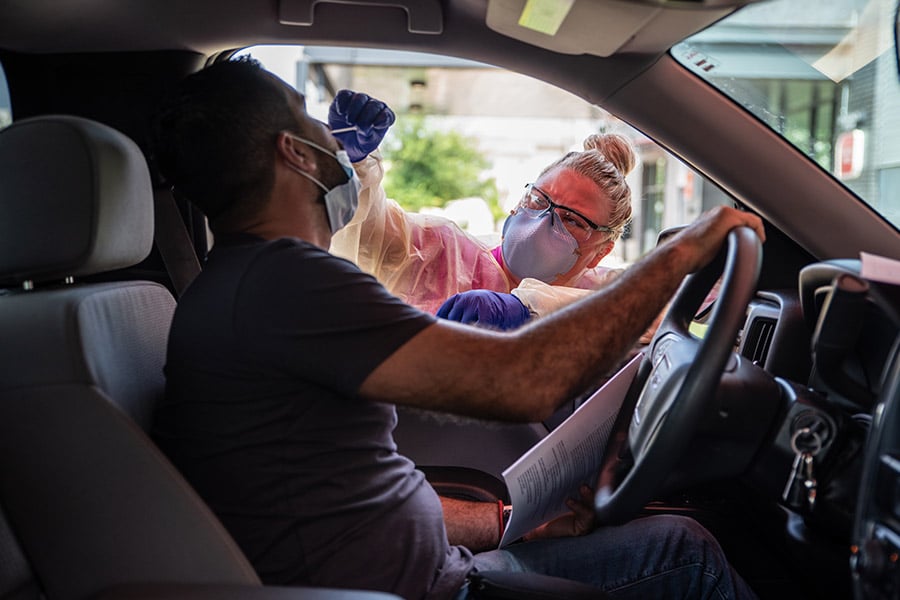Panelists at CCFW forum agree: pandemic disproportionately affects vulnerable populations

A man gets tested for coronavirus at a COVID19 testing center on July 7, 2020 in Austin, Texas. Fort Worth community leaders have observed that the health and economic impacts of coronavirus affects vulnerable populations disproportionately. (Photo by Sergio Flores/Getty Images)
FORT WORTH — “It’s been said that when America catches a cold, the Black community gets pneumonia,” Bob Ray Sanders, communications director for the Fort Worth Metropolitan Black Chamber of Commerce, told the Second Annual Inclusion Forum hosted by Catholic Charities Fort Worth (CCFW).
At the July 13 virtual event, Sanders illustrated this year’s topic — Impacts of the pandemic on vulnerable Tarrant County community members.
Eight panelists, local community leaders serving vulnerable and diverse populations, addressed a virtual audience of 230 and answered questions submitted before and during the event.
Panelists included: Tarrant County Commissioner Devan Allen for Precinct 2; Antonieta Amendolara, CCFW short-term case manager; Mercedes Bolen, vice president of external affairs and community relations for Hillwood, a prominent commercial and industrial real estate developer; Greer L. Christian, vice president and community relations consultant for Wells Fargo Corporate Philanthropy Community Relations; Anette Landeros, president, Fort Worth Hispanic Chamber of Commerce; Catherine Oliveros, Ph.D., vice president of community health improvement for Texas Health Resources; and Christopher Plumlee, chairman of the CCFW board of directors.
As forum moderator, Plumlee opened discussion by noting that the pandemic “has forced our agency and the agencies joining us this afternoon to reexamine and assess how can we best serve our clients during challenging, turbulent, and difficult times.”
Commissioner Allen, the keynote speaker, said regularly collected data shows that “there are member groups of our community who have been disproportionally impacted by the virus in terms of cases, hospitalizations, and deaths.”
She said over 30 percent of Tarrant County deaths from COVID-19 are related to persons in retirement and long-term care facilities, and nearly 40 percent of coronavirus cases have come from the Hispanic community.
“Our communities of color are seeing higher rates of infection and hospitalization,” she continued. “Based on history, initial data, and anecdotal evidence, we know that structural racism and bias in our health care and other systems have led to poor health and other outcomes. They do now as they have for hundreds of years.”
Allen said the Tarrant County Commissioners Court adopted a “four-pillared approach” in response to the pandemic. The county provided funding for testing, economic stimulus, and rental assistance. It also directed funds to Tarrant County cities so they could offer direct relief to residents.
CCFW also made intentional changes in response to the pandemic.
“We have readied ourselves to provide crisis case management, emergency assistance, gift cards, and referrals to thousands of new clients, who we predict will reach 7,000 this year,” Plumlee said.
Though CCFW has a long history of providing long-term case management as a holistic approach to eradicating poverty, the increase in clients due to the pandemic gave birth to a new program — short-term case management.
Antonieta Amendolara, a CCFW short-term case manager, said many new clients “found themselves out of work overnight.”
“We had clients who had never applied for benefits such as food stamps. They were very afraid and emotionally affected,” she added. “Our main focus in short-term case management services is to help clients have a little stability.”
Amendolara reported that since April 6, four short-term case managers worked with 45 to 50 families each, serving 238 clients. She said clients primarily needed assistance with housing, utilities, and transportation.
“When you work with a genuine passion to help others and to give hope to whomever you serve, you’ll never go wrong. This is our focus here at Catholic Charities,” she said.
At Texas Health Resources, Oliveros said the underserved populations that her department already had identified for support were also “disproportionately impacted by the pandemic in prevalence and mortality.”
She said her department is committed to engaging the community in reaching out to vulnerable and isolated persons.
“Churches and faith leaders are so important in our efforts,” she said. “Parishes are trusted sources of information and have access to diverse populations. As partners you can serve as champions of health and provide access to resources that otherwise would be difficult potentially for some communities to access.”
To view a recording of the forum, go to:
